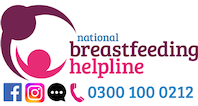Ruth Dennison is a breastfeeding supporter and doula. In 2018, she shared with us, why she brought Black Breastfeeding Week to the UK for the first time. Ruth described Black Breastfeeding Week as ‘a call for action as evidence shows black babies die at a higher rate than any other race.’ You can read Ruth’s original blog here.
Ruth’s powerful account highlighted that many black and racially minoritised mothers have high breastfeeding rates. Black mothers are also less likely to access the high quality infant feeding information and support they need, and more likely to experience breastfeeding trauma. Many black mothers have experienced racism from the professionals and service providers responsible for supporting their breastfeeding journeys.
Like other charities and service providers, the Breastfeeding Network is facing up to the power and privilege that so often results in health inequalities for black and minoritised families. BfN’s journey continues to involve challenging ourselves on the nature of inequality and disadvantage, and the cultural and structural factors that continue to make inequality possible.
BFN is invested in understanding black mothers and how to support them better in our services. Over the last three years, BfN with the help of BRAP, have trained our staff and volunteer force on Bias, Privilege and Equity. We have targeted peer support training to attract under-represented, minoritised communities to our vital supporter, helper and supervisor communities and we have significantly improved the representation of racially minoritised women in our communication materials used to signpost our services. BfN reviewed our Director election and recruitment processes and began improving the terms and family-friendly conditions for our staff.
These are vital steps towards understanding black and racially minoritized mothers and we do not under-estimate the significant work involved. At the same time, we know there is much more to be done and no room for complacency.
The latest MBRRACE-UK report (November 2022) continues to show the stark cost and injustice of inequality for black and minoritised women and their families. Data reported by MBRRACE shows that black women are 3.7 times more likely and Asian women, 1.8 times more likely, to die in maternity than white women. The report shines a light on the ‘one size fits all’ approach, which has not understood, listened or adapted to the specific cultural or health realities of minoritised women.
Black and racially minoritised communities also continue to be significantly more likely to live in areas of high deprivation and face food insecurity. And as MBRRACE shows, women in areas of deprivation continue to have the highest rates of maternal mortality, in turn, often reflective of wider health inequalities and poverty.
These realities must be a wakeup call to every one of us seeking to support women, infants and families through their pregnancy and childbirth journeys. MBRRACE, Five X More and Muslim Women’s Network reports all reference the attitudes, knowledge, assumptions, care and the under-representation of black and minoritised women throughout maternity care. These are urgent challenges to BfN, as they are to every service provider that women and their families encounter, or should encounter.
BfN’s strategy puts tackling infant feeding and health inequalities at its heart and commits us to developing our services to women and families in areas of deprivation and under-served communities. Facing up to power and privilege will mean each one of us taking responsibility to listen, and to continually raise the bar on the services that we develop and deliver. We know that we must continue to work to ensure that our services are experienced as relevant, welcoming and accessible to women and families who may not have power or privilege on their side.
This #BBW23 BfN stands with black mothers throughout the UK. We reflect on the changes we have made and must now hardwire into our work. We reflect on the learning and improvement we must still do. And we consider our own accountability for keeping focus and supporting colleagues to make change happen.
If you would like to keep in touch with us on this journey, please do get in touch ceo@breastfeedingnetwork.org.uk or sign up for the BfN newsletter for updates.
Dr. Ernestine Gheyoh Ndzi, Director and Catherine Hine, CEO

